Coronavirus doctor's diary: ‘Close to death from Covid, I asked them to save my baby’
- Published
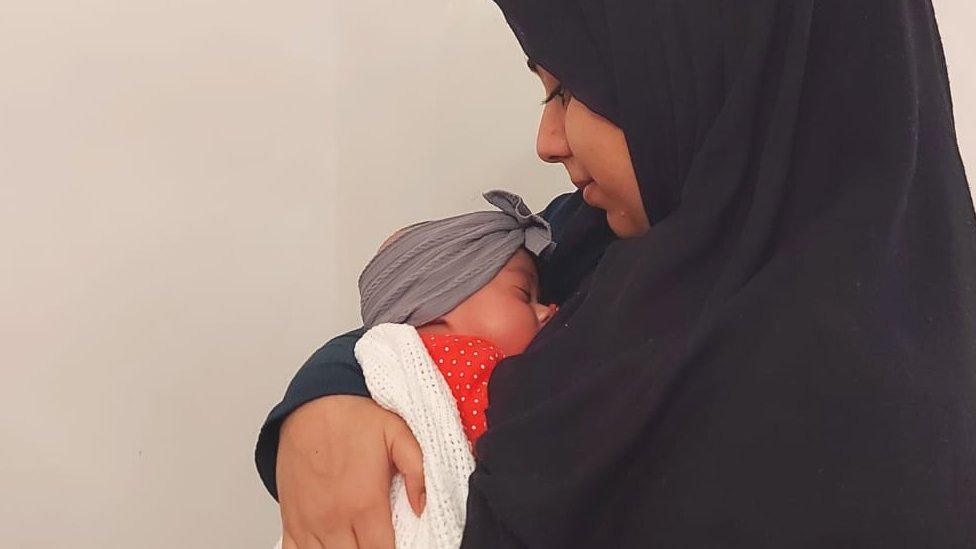
When a young woman was brought to hospital struggling to breathe and seven months pregnant, staff at Bradford Royal Infirmary knew they had two lives to save, writes Dr John Wright.
Mehpara Naqvi is 22, a graduate of Bedfordshire university who came to live in Bradford with her husband, Ali, and his family. They weren't going out much after Covid arrived, she says, just to the supermarket and to buy things for their baby, who was due in December.
But at the start of October, Mehpara got a headache and a cough. Then she started losing her sense of taste and smell, and realised that she probably had Covid. She and Ali isolated in their room at the top of the house; Ali's mother left food outside their door on a tray.
In only two or three days, though, Mehpara's breathing became so bad that Ali called an ambulance. On her first night in hospital her condition deteriorated even further and she was moved to ICU.
In the first wave of Covid, back in the spring, we had no patients who were both pregnant and critically ill. Mehpara was the first, and Debbie Horner, our maternal critical care lead, took a close interest.
Midwives and obstetricians had been checking the baby's heart rate, and she was fine, Debbie told Mehpara, so at that point the best place for her was in the womb. But she added that it might at some point be in Mehpara's best interests for the baby to be delivered, by Caesarean section, because at seven months she would be fine in an incubator on the neonatal ward. She also explained this by telephone to Ali.
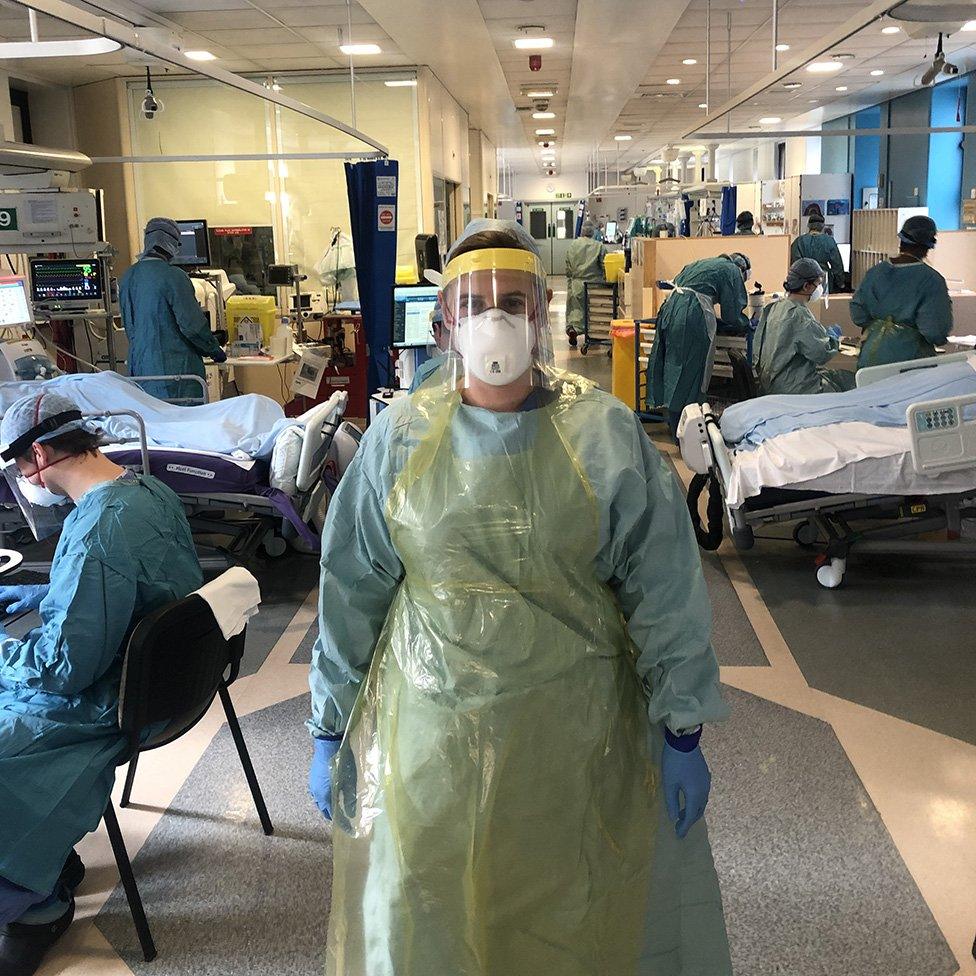
Dr Debbie Horner in full PPE
Mehpara, however, became more and more worried.
"I just thought I'm not going to survive, and something's going to happen to my baby," she says. "So I said to my nurse that I wanted to have a C-section, so they could just take her out. I said, 'I just don't think I'm going to make it so I think you should save my baby.'"
She remembers talking to Debbie at this time.
"She was really reassuring. She said, 'We're not going to let anything happen to you, and we're going to save you and the baby.'"
But Mehpara wasn't convinced that Debbie was right.
As time went on, Mehpara's condition became more troubling, so Debbie conferred with the intensive care consultant on duty. They worried about the extra energy and oxygen demands the baby was generating and the additional pressure pushing on Mehpara's lungs.
"Between her life and the baby's life, it's a fine balance, and we thought that we had probably got to the point where the balance was that we needed to deliver the baby," Debbie says.
I said it might be a few days as a minimum after this, before we can wake you up
The maternity wards are located in a different building, but Debbie and her colleagues had rehearsed for this situation and were ready to use an operating theatre in the main part of the hospital, with all the right staff and equipment.
Alarmingly, on arrival in the theatre, Mehpara's blood oxygen levels sank dangerously low. Debbie and her colleagues took action to increase it, but this convinced them that they would have to do the C-section under general anaesthetic.
She told Mehpara that she would be woken up as soon as possible afterwards.
"But I explained to her that I didn't know how long that was going to be. I said it might be a few days as a minimum after this before we can wake you up."
Once she was under anaesthetic, Mehpara's oxygen levels dropped again - even further. "It was pretty hairy," Debbie says. However, they recovered once more and the Caesarean section was successful. Noor was born at 12:15 on 5 October, weighing 1.5kg (3lb 5oz).
From this point on, things started to go more smoothly. The baby, Noor, was taken by ambulance to the neonatal unit and Mehpara returned to ICU, where she was kept in an induced coma.
"I was on the ventilator for nine days, I think," says Mehpara. "I didn't know I'd given birth, I didn't know anything."

Front-line diary
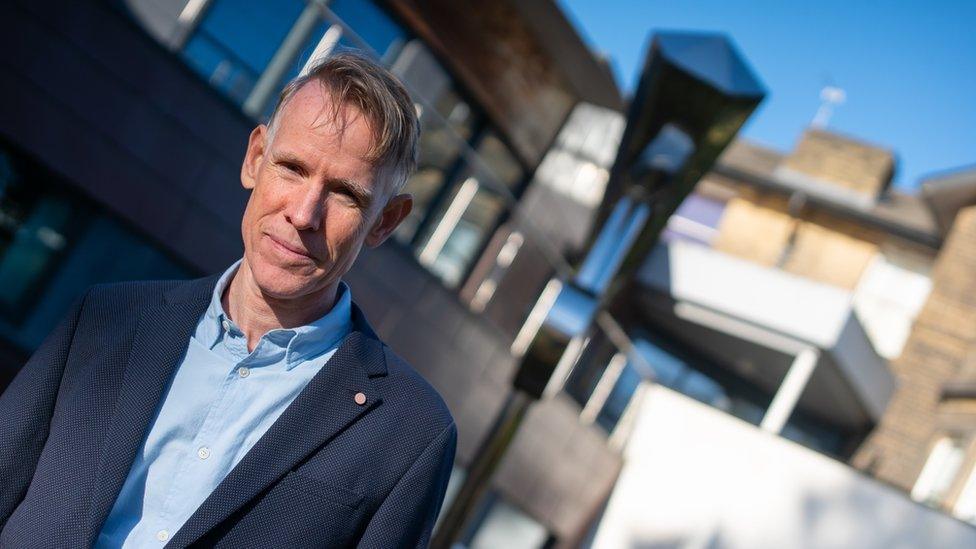
Prof John Wright, a doctor and epidemiologist, is head of the Bradford Institute for Health Research, and a veteran of cholera, HIV and Ebola epidemics in sub-Saharan Africa. He is writing this diary for BBC News and recording from the hospital wards for BBC Radio.
Listen to The NHS Front Line on BBC Sounds and the BBC World Service
Or read the previous online diary entry: 'We turned 90, moved in together - then got the vaccine'

When Mehpara was brought out of the coma, she was drowsy and found it hard to communicate, but quite soon Debbie arranged a video call between her and Ali. By this time, he had finished isolating, and was visiting the neonatal unit when the call took place.
"So she got to see the baby for the first time," Debbie says. "And it was really emotional. She hadn't really been communicating, but she just started to cry. And, you know, I was also emotional and so were the nurses. It was a special thing to share with them, and to have been able to have made that happen,"
Mehpara remembers feeling disoriented after coming round. She couldn't understand why everyone around her was wearing masks and visors.
"I thought, 'Where is my baby?' but I couldn't talk," she says.
But she does remember the first time she saw her daughter.
"They arranged it so that I could see her and that was amazing," she says. "She was so beautiful and I just began to realise what had happened to me, I saw that she was safe and that she'd survived."
They put her on my chest, so I could touch her and see her - I couldn't believe that she was actually alive and that she was well
The next step was to move Mehpara to the women and newborn unit but she wasn't well enough for a few days. Then, finally, mother and baby were reunited.
"When I saw her it was unreal, but I couldn't hold her properly at first because I didn't have the strength in my arms, so they put her on my chest," Mehpara says. "So I could touch her and see her - I couldn't believe that she was actually alive, and that she was well."
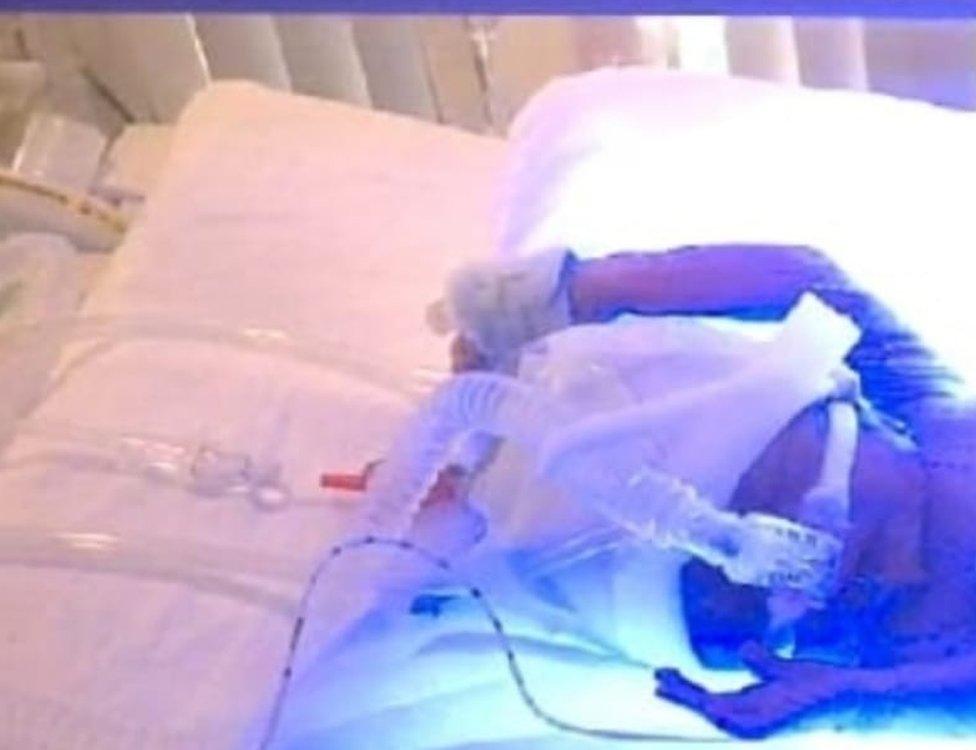
Physios had been working with Mehpara when she was in a coma, helping to clear her lungs so that she could breathe. Afterwards they had to work with her to help her sit again, and eventually to stand. She quickly learned to recognise them through their visors.
Physiotherapist Cordy Gaubert remembers the first time she and her colleagues got Mehpara out of bed.
"The first time we did it we sat her so that she faced the window and could see the outside world and that helped settle her. Then we rang Ali and her mum, so they could see her out of bed," she says. "It was a really nice moment, a very emotional moment."
A touching bond formed between them.
"I'll never ever forget them because I wouldn't have recovered the way I did without them," Mehpara says. "They used to come and see me right from the beginning. I remember Cordy's face and I think, Jackie. The only reason why I'm walking today is because of them."
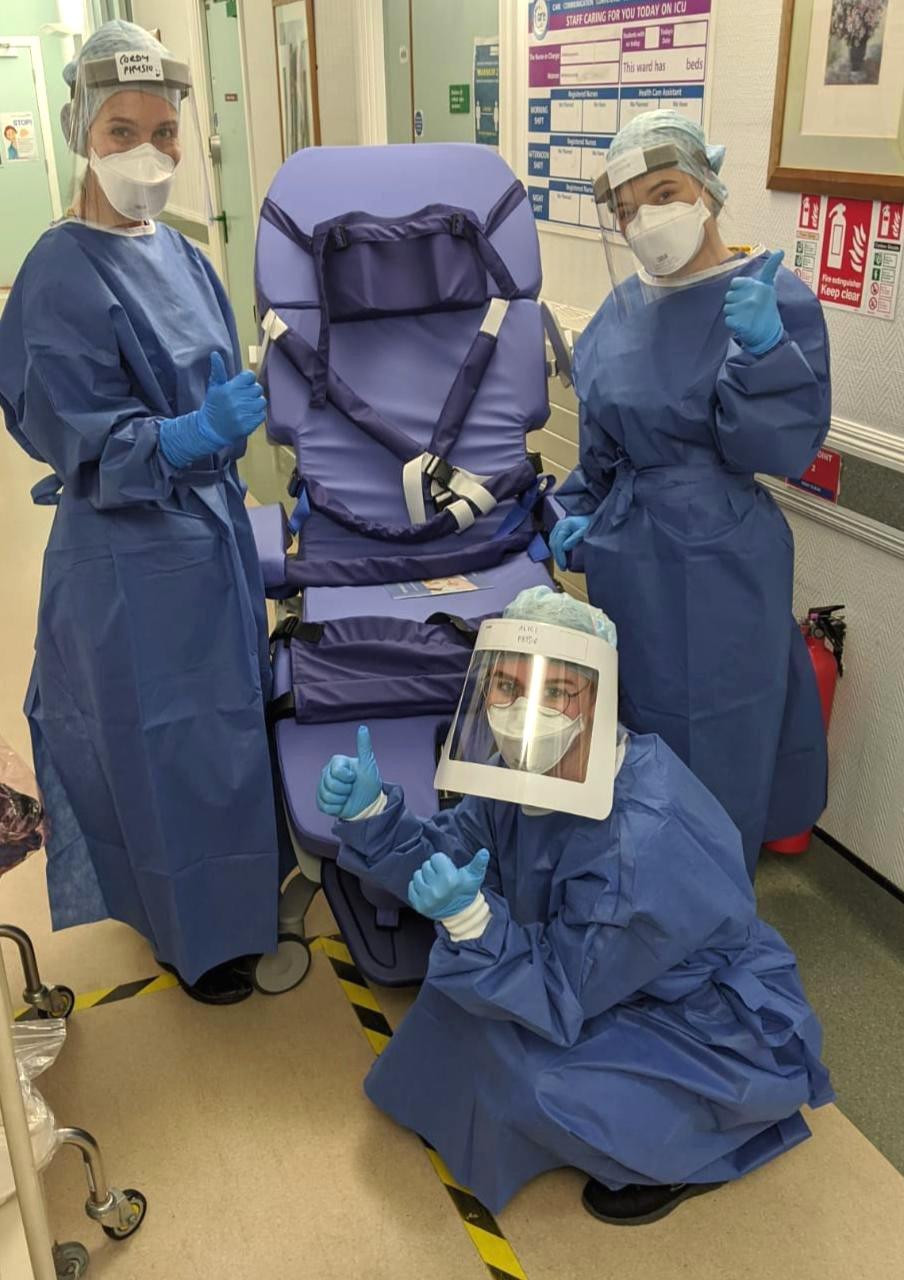
Cordy, left, with other physios and a chair used for teaching people to sit again

For Cordy, the experience was also something to cherish, partly because it had a happy ending.
"Mehpara was critically unwell and there was a chance she wouldn't make it through, which is a hard thing… especially when you've just delivered a baby," she says. "We've had a lot of tragic stories with our Covid patients, a lot of people who haven't made it out of there, and we try to cling on to these patients who recover."
Mehpara finally left hospital on 3 November, about a month after she had arrived.
I forget a lot of things now, but I have hope and I've got faith that I will eventually get fully back to normal again
When I spoke to her she had already been at home for a few weeks. Noor was 7lb, "a beautiful and happy baby" in Mehpara's words.
Like many people who have spent time on ICU with Covid, Mehpara is making a gradual recovery. It will take time. She struggles to walk long distances and is occasionally breathless.
"And the biggest thing I think is the brain fog. I forget a lot of things now, but I have hope and I've got faith that I will eventually get fully back to normal again," she says.
"I'm just 22. And I was generally healthy, but I got it so badly that it shows it's not limited to age."
Debbie Horner is relieved that the story ended so well for Mehpara, Ali and Noor.
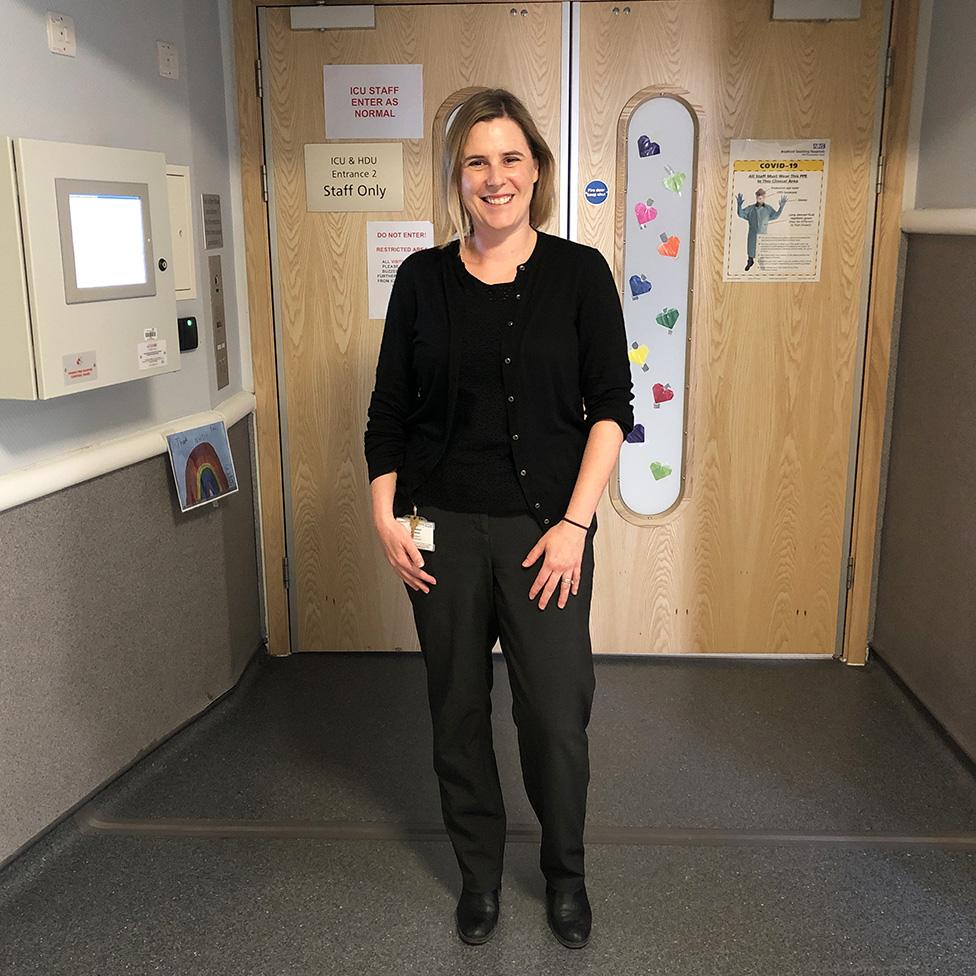
Dr Debbie Horner without PPE
"I'm really pleased that things worked out for them, actually, because it was a really difficult case, and it was stressful for everyone," she says.
Mehpara, for her part, admits that there was a time when she didn't take the virus very seriously, and reflects ruefully on the fact that some people in her community, influenced by misinformation, advised against going to hospital.
"Honestly, me going to the hospital saved my life," she says. "If I had stayed at home I actually think something very bad would have happened to me and Noor, so I'm really glad I went. I owe the NHS staff my life."

During the first wave we were worried about the health of pregnant women. They had a particularly high risk of serious illness from swine flu in 2009, and almost a 100% fatality rate from Ebola in Sierra Leone in 2014. As the pandemic progressed it became clear that Covid was not serious for the vast majority of pregnant women, though the risk was significantly greater than for non-pregnant women, and higher again if you were black or Asian.

Bradford City Hall this week, and, in front of it, a Covid testing tent
But one of the gaps in the remarkable progress of medical research that has underpinned our response to the pandemic has recently been highlighted - pregnant women are generally excluded from clinical trials of treatments and vaccines. There are calls to urgently redress this omission, external, as we need effective treatments and vaccines for all.
Since the start of the pandemic in March 2020 the hospital has looked after nearly 3,000 patients with Covid-19. It has been a sombre year, with almost 500 of our patients dying from the infection. Now is an appropriate time to remember those who have lost their lives, but also celebrate the many patients whose lives we have saved.
For some patients this road to recovery has been almost miraculous. Patients who have died and been pulled back into life. Patients who have spent weeks in a coma on ICU and then walked out of the hospital. Many of these patients are still suffering the long-term psychological and physical effects of serious illness but with the help of our fantastic physiotherapists they are gradually returning to their previous lives.
Follow @docjohnwright, external and radio producer @SueM1tchell, external on Twitter

TESTING: How do I get a virus test?
LOOK-UP TOOL: How many cases in your area?
LOCKDOWN LOOK-UP: The rules in your area
SCHOOLS: Will they go back in January?
